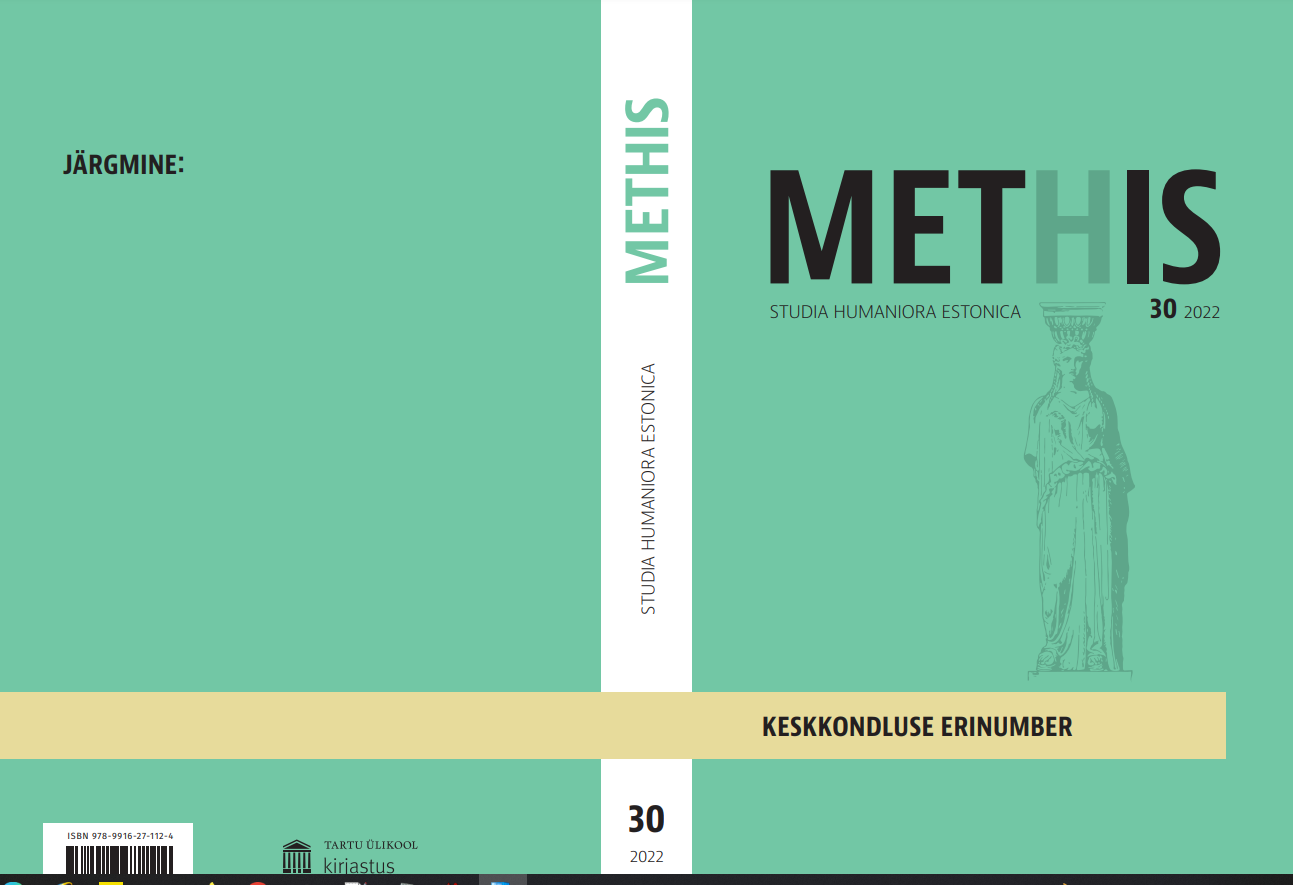Loodusmõttest aktivismini: saateks keskkondluse erinumbrile / From Nature Contemplation to Activism: A Special Issue on Environmentalism
Saateks keskkondluse erinumbrile / A Special Issue on Environmentalism
DOI:
https://doi.org/10.7592/methis.v24i30.22100Keywords:
keskkondlus, keskkonnaliikumised, loodus, keskkond, kirjandus, environment, nature, environmentalism, movements, literatureAbstract
The introduction to the special issue of Methis on Estonian environmentalism provides an overview of the phenomenon of environmentalism and its spread across political periods, economic formations, and regions. The essay starts by contextualising the central concepts of the issue, ‘environmentalism’ and its possible translation into Estonian as ‘keskkondlus’, and its relationship with the concept of ‘nature’. At the end of the 1980s, amidst a deepening awareness of environmental crisis, some authors announced ‘nature’ to have met its end. While this end has become widely accepted within environmental discourse, the approach clashes with the traditional thinking about the beauty of nature and its strong bonds with national identities. To foster discussion and to bridge the discursive and ideological gap between the two perceptions, the authors of the articles use the concept as an umbrella term for both paradigms.
The second part of the introductory article discusses East European environmentalism, drawing attention to the research into erroneous assumptions regarding the lack of environmental activism within the Soviet Union. Before its brief heyday in the 1980s, East European environmentalism was hidden within economy, policy, society and culture. However, its roots went deeper, reaching back to 18th- and 19th-century thought, to Baltic German – and later Estonian – early voluntary associations and the value seen in the homeland and its natural objects. The founding of animal and nature protection societies in the late 19th century was an early practical outcome, and similar thought became pronounced in print culture. In early 20th century, several nature protection areas were established, and people became avid consumers of popular science journals – an interest that would continue throughout the Soviet period. The 1970s saw an environmental movement to protect the wetlands of Estonia which were in danger of being drained. Throughout the 20th century, also fiction reflected the prevailing views of nature and emerging concerns about the environment.
The issue’s opening article by Ulrike Plath and Kaarel Vanamölder takes us back to the 17th century to demonstrate the possibility of climate movements more than three centuries ago. This is followed by Karl Hein’s case study that depicts in detail the emergence of animal protection in Estonia a hundred years ago in the context of local and regional history. The next four articles focus on different aspects of environmental movements in the Soviet period. Elle-Mari Talivee retells the story of the peculiar character of Atom-Boy created by the childrens’ author Vladimir Beekman who depicts in this form the various developments in the Soviet nuclear industry. This example from children’s literature is paralleled by similar environmental concerns expressed in visual arts, as outlined in Linda Kaljundi’s article. In a more theoretical take on liberal and autocratic environmental protection, Viktor Pál discusses the Soviet propagandistic use of environmental issues. Olev Liivik contextualises the protests against phosphorite mining in the 1970–80s within the wider trends in the Soviet Union, including the practice of sending letters of complaint to the media, and the various waves of environmental dissent. The discussion of a more compact case of the so-called Green Cycling Tours by Tambet Muide demonstrates the same increasingly oppositional stance that took hold in the 1980s. Regarding the post-Soviet era, Tõnno Jonuks, Lona Päll, Atko Remmel and Ulla Kadakas analyse the various conflicts that have emerged around natural and cultural objects protected by law since the 1990s. In the freestanding article of the issue, Raili Lass writes on interlinguistic and intersemiotic procedures of translation in the theatre but, as our introductory essay suggests, points of convergence may be found here with the discussion of staging of conflicts in environmental protection. In the “Theory in Translation” section Timothy Morton’s classic discussion of environmentalism is published in Ene-Reet Soovik’s translation, accompanied by introductory remarks from the translator and Kadri Tüür.
The final part of the issue’s introduction offers a comparative and interdisciplinary take on the themes discussed. The revelatory nature of historical events of any era, especially natural disasters or the conditions of their unfolding, uncovers the socio-environmental relations that push people to respond. Whether or not such responses become environmental movements depends on the context that either recognises or ignores human embeddedness in the environment. Searching for such parallels connects 21st century climate activism and 17th century upheavals, animal protection in the 1920s and a hundred years later. The Soviet period allows a simultaneous scrutiny of both the limited and ideological take on the apparent lack of Soviet environmentalism as well as the methodological challenges of finding the footprints of hidden awareness and activism. Unearthing this from literature, art and the restrained presence of expert voices also provides an explanation to the sudden explosion of activism in the 1980s. The silence of the next decades further proves that there is nothing obvious in the ways in which environmentalism can take hold of society, which demands precise and detailed inquiry such as provided by the authors of this special issue.


